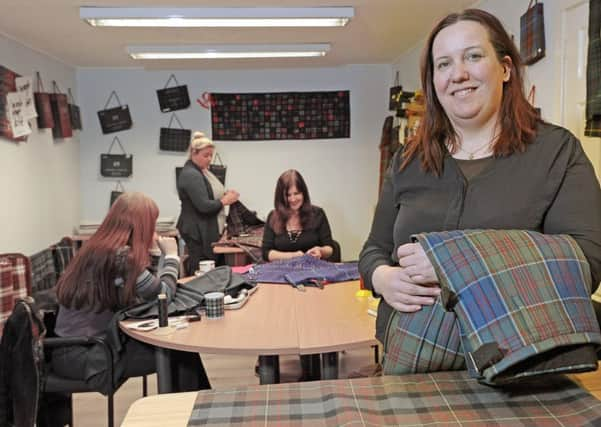Kilt-makers unveil drive for '˜ethical' making of clothing


Now Scotland’s kilt- makers are on the warpath wanting better payment and conditions for their hours of hard work spent sewing by persuading consumers to source “ethical” hand-stitched kilts when splashing the cash on the iconic symbol of Scotland’s clan history.
A new enterprise, The Kiltmakery, is now making and selling hand-stitched “ethical kilts” produced in good working conditions and with decent pay.
Advertisement
Hide AdAdvertisement
Hide AdKilt-maker Amanda Moffet one of the directors of The Kiltmakery at ScotClan clan centre, in Sandport Place, Leith, in Edinburgh, said it was time to bring the craft “out of the shadows” and was part of the worldwide movement ensuring clothing is produced ethically and not regarded as disposable.
Moffet also said whilst there are kilt-making establishments in Scotland paying workers a good salary, such as 21st Century Kilts in Edinburgh, many people making hand-stitched kilts work in isolation, often in remote parts of the country.
Others have faced a change in personal circumstances, such as bereavement or unemployment and the work is vital to their family budget.
She also said many are poorly paid for their work – a hand-stitched kilt costs £400 and takes three days but Moffet said she had heard of a woman paid just £30 to £40 per kilt.
“The way many people buy a kilt is to go into a shop, even high-end kilt shops where they pay top dollar or order online. They may be marketed as ‘hand-stitched’ but can be just ‘hand-finished’ by a chain of ‘invisible’ people who don’t know who has ordered the kilt,” said Moffet.
“In contrast, completely hand-stitched kilts are usually made in workshops or by freelancers and take three whole days to make.”
Moffet said she would like to see people seek out ethical kilts in the same way many people choose shops selling conflict-free diamonds for jewellery.
“People can go directly to a kilt-maker, using Facebook, or ask around. If you’re spending around £400 on a kilt you want to make sure the measurements are taken by someone who knows what they are, it is good quality and not outsourced all over the place.”
Advertisement
Hide AdAdvertisement
Hide AdThe Kiltmakery’s last big order was 220 hand-stitched kilts for the Kiltie Band in Florida who came over and visited them before putting in their order.
Ian Chisholm, a founding member of the Kilt Makers’ Association of Scotland, said that people with hand-tailoring kilt-making skills were a highly valuable workforce.
“A tremendous amount of work goes into hand-tailoring a kilt. Many people working on their own don’t have a lot of facilities and can’t come into a workroom,” said Chisholm, whose father founded Chisholms Highland Dress in Inverness in 1956.